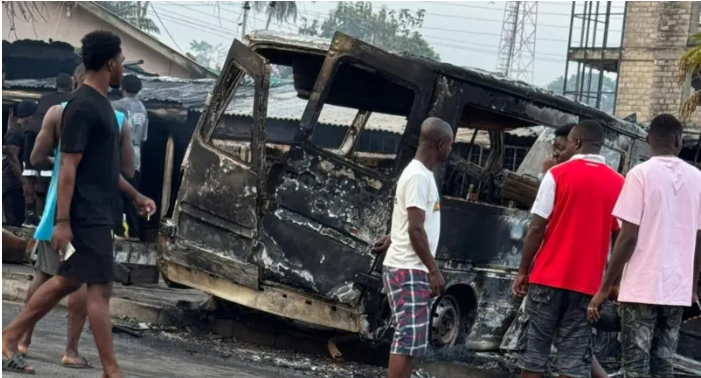
At least seven individuals were killed and several others injured in a violent clash between illegal miners and soldiers guarding a mine in Ghana’s central Ashanti region. According to the Ghana Armed Forces, the conflict unfolded when around 60 illegal miners armed with “pump action guns” breached the security of an AngloGold Ashanti-run mine. The miners reportedly opened fire when intercepted by soldiers, prompting the military to retaliate in self-defense.
In a statement, the Ghana Armed Forces confirmed the deaths, but a representative of the miners denied the allegations, claiming that the miners were unarmed at the time of the incident. This version of events contradicts the military’s assertion that the miners had been wielding locally manufactured rifles and other weapons. The deadly altercation has stoked widespread outrage and violence in the region.
Following the incident, angry protests erupted in Obuasi town, with demonstrators setting fire to several buses and vehicles on the grounds of AngloGold Ashanti. The destruction of company property marked an escalation of tensions between the mining giant and local residents. As unrest spread, local businesses and schools in the area closed temporarily in response to the violence.
The death toll has been a subject of dispute, with the Ghana National Association of Small-Scale Miners indicating that up to nine people may have lost their lives, while the presidency reported a total of eight. The Ghanaian government has vowed to investigate the events surrounding the clash and hold any individuals responsible for unlawful actions accountable.
President John Mahama has ordered a full investigation into the matter, insisting that justice will be served for those involved in the deaths of the miners. The government has also called on AngloGold Ashanti to bear the costs of medical treatment for the injured and the burial expenses for the deceased. The company, while expressing concern for the safety and well-being of its workers and local community members, has assured that the situation has now calmed down.
Kofi Adams, the chairman of the Ghana National Association of Small-Scale Miners, condemned the violence, describing the incident as “unprecedented.” He also questioned the actions of the military, pointing out that in the past, warning shots were fired rather than resorting to lethal force. The miners’ representative stressed that the confrontation could have been avoided, calling for more dialogue between the military, miners, and local authorities to resolve the issue peacefully.
The conflict has deepened existing tensions between AngloGold Ashanti and the local population. Many residents accuse the multinational corporation of exploiting the region’s mineral resources without adequately contributing to local development or job creation. As unemployment and economic hardship continue to plague the region, small-scale mining has grown, contributing to unregulated mining sites that have caused severe environmental damage.
Amid Ghana’s ongoing economic crisis—marked by rising inflation, high public debt, and increasing unemployment—the demand for jobs has intensified, particularly in areas affected by mining. Some local small-scale mining groups have even called for mining concessions currently held by AngloGold Ashanti to be allocated to local businesses to improve the economic conditions of the community.
In light of the growing unrest, some local schools built and managed by the company in the region have shut down for two days, reflecting the broader instability caused by the violence. The situation remains fragile, and authorities have pledged to take swift action to restore peace and prevent further conflict between the military, the company, and local miners.
The incident highlights the mounting challenges facing Ghana’s mining sector, including the proliferation of illegal mining operations, lack of effective regulation, and increasing pressure on local resources. As the country continues to grapple with its economic challenges, the violence in Obuasi underscores the urgent need for comprehensive reforms in the mining industry and greater cooperation between stakeholders to ensure the well-being of the local population.







